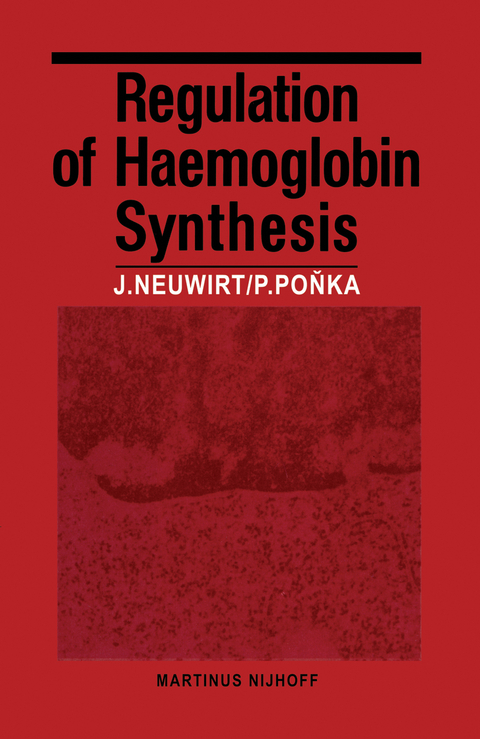
Regulation of Haemoglobin Synthesis
Kluwer Academic Publishers (Verlag)
978-90-247-1999-0 (ISBN)
1. Introduction.- 2. Substrate Supply for Haemoglobin Syntheses.- Iron Uptake.- Mechanism of iron supply to erythroid cells.- Factors influencing iron uptake by erythroid cells.- Iron and transferrin levels and transferrin saturation.- Metabolic state of crythroid cells.- The role of sulfhydryl groups in iron uptake.- Other factors which influence iron uptake.- Iron uptake from chelating agents.- Intracellular kinetics of iron.- Ferritin.- Other non-haem iron proteins and iron complexes.- Mitochondrial iron.- Inhibitors of haem synthesis as a tool in investigations of the intracellular kinetics of iron.- Regulation of iron supply for haemoglobin synthesis.- Effect of haem on iron uptake by reticulocytes.- Effort of inhibitors of haem and globin syntheses on iron uptake.- Mechanism of the effcct of haem on iron uptake.- Regulation of Uptake of Glycine and other Amino Acids.- 3. Haem Synthesis.- Biosynthesis of Haem.- General introduction.- ALA synthesis.- ALA synthetase.- Porphobilinogen (PBG) synthesis. ALA dehydrase enzyme.- Conversion of porphobilinogen (PBG) to uroporphyrinogen III.- Conversion of uroporphyrinogen to coproporphyrinogen by the enzyme uroporphyrinogen decarboxylase.- Conversion of coproporphynnogen lo protoporphyrinogen by the enzyme coproporphyrinogen oxidase.- Combination of iron with protoporphyrin.- Free protoporphyrin.- Regulation of Haem Biosynthesis.- Enzyme synthesis.- Changes in enzyme activity.- Regulation by substrate supply.- Metabolic and external factors.- Haem catabolism.- 4. Globin Synthesis.- Globin Biosynthesis.- General introduction.- Role of ribonucleic acids in globin synthesis.- Messenger RNA.- Isolation and identification of globin mRNA.- Methods used for the isolation of globin mRNA.- Detection of messenger RNA for globin.- Characteristics of globin mRNA.- Biosynthesis of globin mRNA.- Transfer RNA.- Ribosomes and globin synthesis.- Ribosome structure.- The role of polyribosomes.- The role of sub-units.- Membrane-bound ribosomes.- Function of the active ribosomal complex.- Initiation of the globin chain.- Initiation of globin synthesis by means of methionyl-tRNA.- Initiation factors of reticulocyte ribosomes.- Elongation of the globin chain.- Globin chain termination.- Regulation of Globin Synthesis.- Post-transcription control of globin synthesis.- Stability of globin mRNA.- Translation control.- Rate limiting step in the synthesis of the globin chain.- Synchronization of synthesis of different chains.- The role of haem in globin synthesis.- 5. Regulation of Haemoglobin Synthesis.- Coordination of Haem and Globin Syntheses.- Regulatory role of haem.- Mutual relations between haem and globin synthesis.- Haemoglobin Synthesis During Maturation.- 6. Differentiation of Erythroid Cells.- Erythroid Differentiation in Haematopoietic Tissue and the Initiation of Haemoglobin Synthesis.- Mechamun of erythropoietin action.- Erythroid Differentiation Without Erythropoietin.- 7. Anaemias Due to Disorders of Haemoglobinization.- Hypochromic Anaemias Due to Impaired Haem Synthesis.- Hypochromic anaemias caused by a reduced iron supply into erythroid tissue.- Iron deficiency anaemia.- Congenital atransferrinaemia.- Hypochromic anaemia as a result of reduced iron release from reticuloendothelial cells.- Copper defficiency.- Sideroblastic anaemias.- Hypochromic Anaemias Due to Impaired Globin Synthesis.- Thalassaemia.- ?-thalassaemia.- Haemoglobin Constant Spring and related mutants of the terminal portion of the chain.- ß- and ?ß-thalassaemia.- References.
| Erscheint lt. Verlag | 31.8.1977 |
|---|---|
| Zusatzinfo | IX, 197 p. |
| Verlagsort | Dordrecht |
| Sprache | englisch |
| Maße | 210 x 297 mm |
| Themenwelt | Medizinische Fachgebiete ► Innere Medizin ► Hämatologie |
| ISBN-10 | 90-247-1999-2 / 9024719992 |
| ISBN-13 | 978-90-247-1999-0 / 9789024719990 |
| Zustand | Neuware |
| Haben Sie eine Frage zum Produkt? |
aus dem Bereich


